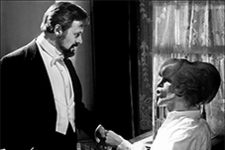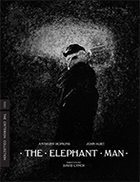The Elephant Man
|  Whenever people write about David Lynch’s The Elephant Man, the word dignity tends to be the central focus of their analysis. The film tells the true-life story of Joseph (John) Merrick, a young man living in Victorian London who was so severely disfigured that he could not take part in normal society and spent much of his life shunned and gawked at as a freak-show attraction in a traveling circus. To some extent, it is right that the focus be on Merrick’s dignity, and it is hard to get beyond the film’s bittersweet fairy-tale surface. By all accounts, Merrick was an intelligent, thoughtful, sensitive man who could read and write in an era when such skills were rare in the lower classes, and he is played perfectly in the film by John Hurt, who allows the character’s humanity to emerge from beneath all the twisted flesh. Merrick’s life was short (he died when he was 27), but those who knew him personally have attested to his personal strength and integrity. Despite the misery of being a social outcast—for most of his life he was loved by no one and shunned by all—Merrick’s sense of self and his refusal to give in to the prejudices of others is a monument to the strength of human dignity. Yet, such a reading is too easy—it takes the obvious sentimental route, allowing us to feel good about ourselves for watching a movie about a severely deformed man. We congratulate ourselves for thinking that, had we been alive in the 1880s, we would have been one of the caring members of London society who took Merrick out of the freak show and made a special home for him at the London Hospital, where he lived out the last years of his life with as much normalcy as possible. We would have been good to this poor soul. Rather, the film is much more fascinating and engaging in the way it deals with Merrick’s life on a social level. Viewers always assume that the film is about John Merrick, but I would argue that it is really about London society in the Victorian era. Merrick is the film’s central figure, and it is with him that we most identify, but he is also a mirror that reflects the hypocrisies and faults of England in the late 19th century, a time that is as well known for its rapid industrialization as it is for giving rise to Jack the Ripper. Part of the key to understanding The Elephant Man as a film more about society than its titular character is the career of director David Lynch. While this was his first studio film, Lynch’s subsequent career provides ample evidence of his fascination with the darkness beneath the surface of everyday life, whether that be in the much-heralded metaphorical opening sequence of his masterpiece Blue Velvet (1986), which gives us an increasingly closer view of the monstrosities that live and breed in our front yards, or the giddy kick he gets out of skewing everyday reality in his cult television series Twin Peaks and Mulholland Drive (2001). While Lynch may have been drawn to the idea of a film whose central protagonist was so misshapen that he couldn’t go out into public, it is more likely that he was drawn to the complex reactions Merrick’s perceived monstrosity provoked. As Rosemarie Garland Thomson argued in the introduction to Freakery: Cultural Spectacles of the Extraordinary Body, “Whether generating awe, delight, terror, or knowledge, the monstrous emerges from culture-bound expectations even as it violates them.” Much of The Elephant Man is structured around the relationship between Merrick and Dr. Frederick Treves (Anthony Hopkins), a surgeon at the London Hospital and lecturer in anatomy who discovers Merrick when he is living with the circus, essentially the property of the circus proprietor, Bytes (Freddie Jones). The scene in which Treves first views Merrick is one of great power, as Lynch gives us a slow zoom on Treves’s frozen, stunned face as a single tear falls from his eye. Whether it be a tear of pity or horror, the central point is that to see John Merrick is to be emotionally affected. Treves takes Merrick from the circus and houses him at the London Hospital. His first goal is to study this human anomaly, and his showing Merrick as part of a lecture to a medical society is just as cruel as Bytes’s peddling him as a freak exhibit. While Treves may use the detached language of a scientist, his medical descriptions of Merrick are no less injurious than Bytes’ describing him as “the horrible Elephant Man.” In Bytes’s language, Merrick is a terrible wonder to behold; in Treves’s language, his is a mistake of nature that needs to be understood scientifically. In neither is he considered human. However, unlike Bytes, who calls Merrick his “treasure,” but beats him mercilessly, Treves comes to view Merrick as first and foremost a human being, especially once he realizes Merrick’s intellect and his capacity for expressing emotion, despite his tragic inability to smile. The film takes an interesting turn at this point, as the story begins to focus on how Merrick became an unlikely hit in London’s fashionable upper-class circles. Once Mrs. Kendal (Anne Bancroft), a celebrated stage actress, visits him at the hospital, others follow suit. Visiting the Elephant Man for afternoon tea becomes the new vogue, even though many of those who do it are obviously repulsed to be in his presence (which allows for Lynch to insert a few moments of delicious black humor). The head nurse (Wendy Hiller) says it best when she declares to Treves that “he’s being stared at all over again.” Whether he is in a cage at a circus or in a well-appointed hospital room, those coming to see him are not interested in Merrick the person, but Merrick the monstrous body. The film’s fascination with the two-faced nature of Victorian London society is borne out in how Lynch employs veteran cinematographer Freddie Francis’s gorgeous black and white photography. Over and over again, Lynch’s camera is fixated on elements of industrialization and modernity—billowing smoke stacks, enormous machinery, steam pipes, an operation on the mangled body of the victim of an industrial accident. While much of the story takes place in the world of the upper class—the hospital, Treves’s home, the opera—many scenes are set in the squalid back alleys of London, which immediately establishes a consistent visual juxtaposition that illustrates Victorian society’s deep split. This is complicated, however, by Merrick’s outcast status, as his deformed body precludes his being fully a part of either the upper or the lower class—he is completely outside. Although it is now heralded as a beautifully produced, deeply humanistic film (it was nominated for eight Oscars, although it won none), The Elephant Man was an unlikely success story. After all, it was the first project produced by Brooksfilms, a new production company founded by Mel Brooks, best known for writing and directing edgy satires like The Producers (1968) and Blazing Saddles (1974). And Lynch was an unknown when he directed it, his only other feature film being the self-financed, midnight-circuit surrealist odyssey Eraserhead (1978). Yet, perhaps because of the oddity of its production, The Elephant Man avoided the obvious traps of simple romanticism and playing into sheer pity for Merrick’s noble plight. While Merrick is portrayed as a portrait of human dignity in the face of great prejudice and misunderstanding, always in the background, constantly threatening to rupture the bittersweet surface, is Lynch’s insistent focus on the complexities of the world in which he happened to live and die.
Copyright © 2020 James Kendrick Thoughts? E-mail James Kendrick All images copyright © Paramount Pictures / The Criterion Collection | |||||||||||||||||||||||||||||||
Overall Rating: 


 (3.5)
(3.5)


